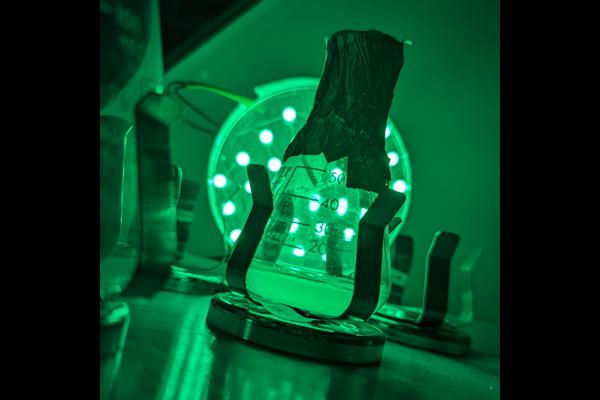- Share
- Share on Facebook
- Share on X
- Share on LinkedIn
Thesis defence
On March 21, 2024

Thibault Clavier (LIPhy, BIOP)
The major challenges for the biotechnological production of metabolites or proteins consists in optimizing yield (amount of target molecules produced per amount of nutrient molecules) or productivity (amount of target molecules produced per unit time). We propose to tackle these challenges by combing genome engineering of E. coli with advanced process technologies using optimal control through optogenetics. We have previously constructed a strain of E. coli where growth is genetically controlled by an external chemical signal, IPTG. This strain achieves a yield of the model metabolite glycerol very close to the theoretical maximum (Izard et al, 2015). We have improved the long-term stability of the strain (unpublished data) allowing a continuous production for weeks or months. We have also developed an automated mini-bioreactor system that allows to impose any sort of growth control on the culture (change of medium, pH, temperature, light, ). In particular, we can impose complicated control schemes using light and an optogenetic control of growth. The first par of the project consists in changing the chemical control of gene expression to an optogenetic control of the expression of RNA polymerase (and thus growth rate) and to characterize the novel strain. This tool will allow to answer important fundamental questions about resource allocation in bacteria. In collaboration with the bioinformatics team of INRIA, we have developed a mathematical model of the bacterium and the bioreactor system. We can now use control theory to achieve the desired objective, for example an optimal trade-off between yield and productivity, by imposing a complicated control scheme on the bacterial culture (de Jong et al, 2017a). The second part of the project consists in exploring the different control schemes and measure the performance of the culture in the bioreactors, including the management of growth inhibiting metabolites such as acetate (Pinhal et al, 2019). The thesis project offers a combination of fundamental and applied research. The characterization of the engineered strain will reveal the fundamental resource allocation strategies of bacteria. The optimal control will promote the transfer of the strain to biotechnological applications. The project is interdisciplinary: the major part of the project consists in biological experiments, the environment of a physics laboratory allow the custom development of the bioreactor system and the collaboration with the bioinformatics team is necessary for conceiving the optimal control strategies.
Date
14:00
Localisation
LIPhy, salle de conférence
- Share
- Share on Facebook
- Share on X
- Share on LinkedIn